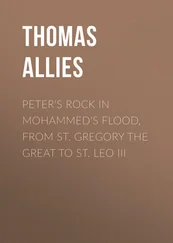Thomas Allies - Journal in France in 1845 and 1848 with Letters from Italy in 1847
Здесь есть возможность читать онлайн «Thomas Allies - Journal in France in 1845 and 1848 with Letters from Italy in 1847» — ознакомительный отрывок электронной книги совершенно бесплатно, а после прочтения отрывка купить полную версию. В некоторых случаях можно слушать аудио, скачать через торрент в формате fb2 и присутствует краткое содержание. Жанр: foreign_antique, foreign_prose, на английском языке. Описание произведения, (предисловие) а так же отзывы посетителей доступны на портале библиотеки ЛибКат.
- Название:Journal in France in 1845 and 1848 with Letters from Italy in 1847
- Автор:
- Жанр:
- Год:неизвестен
- ISBN:нет данных
- Рейтинг книги:4 / 5. Голосов: 1
-
Избранное:Добавить в избранное
- Отзывы:
-
Ваша оценка:
- 80
- 1
- 2
- 3
- 4
- 5
Journal in France in 1845 and 1848 with Letters from Italy in 1847: краткое содержание, описание и аннотация
Предлагаем к чтению аннотацию, описание, краткое содержание или предисловие (зависит от того, что написал сам автор книги «Journal in France in 1845 and 1848 with Letters from Italy in 1847»). Если вы не нашли необходимую информацию о книге — напишите в комментариях, мы постараемся отыскать её.
Journal in France in 1845 and 1848 with Letters from Italy in 1847 — читать онлайн ознакомительный отрывок
Ниже представлен текст книги, разбитый по страницам. Система сохранения места последней прочитанной страницы, позволяет с удобством читать онлайн бесплатно книгу «Journal in France in 1845 and 1848 with Letters from Italy in 1847», без необходимости каждый раз заново искать на чём Вы остановились. Поставьте закладку, и сможете в любой момент перейти на страницу, на которой закончили чтение.
Интервал:
Закладка:
"It being a fasting vigil with them, they dine without meat at twelve, and are allowed to take a snack in the evening, not a full meal. He asked questions about the course of studies at Oxford, and whether there was not in England an inclination 'to imitate their ceremonies.' I told him I hoped the tendency was something more than that, &c. &c. We asked him about philosophy in the French Church. He said they used chiefly that of Aristotle, and that one could only find particular branches well worked out. They were much occupied in fighting Cousin. He and his four vicaires have a parish of 15,000 souls to look after. They have also many confessions to receive from other parishes; but for the Easter communion every one is expected to go to his own parish priest, or at least to communicate at his own church. He says Rouen is rather a religious place. I did not ask him the proportion of communicants, for fear I should seem to be inquiring for criticism. He was obliged to leave us soon after dinner, but sent us on to one of his vicaires, who took us to the house of the Frères des Ecoles Chrétiennes, and introduced us to one of them, who showed us the chapel, dormitory, &c. The founder of the order, the Père de la Salle, is buried behind the altar. There are seats for the brethren, and there is a room or gallery looking in at the west end for the boys, who only enter the chapel on Sundays and saints days for the Salut du St. Sacrement. They use this gallery for their morning and evening prayers, which, I believe, are those at the end of the Catechism. The brethren are laymen, but they have two aumoniers who say mass in their chapel twice a day. They have not the breviary services to say, being occupied all day with their schools, but they hear mass, use the rosary, attend the salut, &c. There are thirty-nine brethren, and they have a normal school, i. e. a training school, of forty young men. They do not admit them under seventeen. Their course is about three years. They prepare them for 'l'instruction primaire' of the superior kind, that is, extending to a little history, chemistry, and the like, (and some of them learning also modern languages,) but not comprising Latin or Greek. Twenty-seven of the brethren, however, are occupied in schools about the town, in which, if I understood right, there are as many as 2500 children. We could not see the cabinets of mineralogy, &c. or the chemical laboratory. There were two or three little organs for music lessons. The dormitories had separate cells, with a passage along the line of them. One of the brethren sleeps in each dormitory, and stays up till all are gone to bed, to be sure that good order is kept. They are licensed by the university, and some of the scholars are supported or helped by the government." – M.
Yesterday, June 29. Sunday, St. Peter's day. – We went to high mass in the cathedral at ten, but though we had looked out the service as well as we could, and were just on the outside of the higher gate of the choir, we could not in general follow; only at the Gospel and the Creed we regained our footing. Certainly the words of the service, incomparably beautiful as they are, must be in the main lost. We could not, even by observing the gestures, with the book before us, follow them; the priest's voice is hardly ever heard. A poor woman beside me chaunted through the Nicene Creed in Latin, and at vespers at St. Ouen many female voices were doing the same with the Psalms. The really edifying thing is the devotion of the people, who look upon it as a sacrifice, and do not seem to require that perpetual stimulating of the understanding as among us. For there was no sermon either at the cathedral or St. Ouen, save after the Gospel a very short address, as it seemed, in the nave, but nobody moved from the choir. This service lasted an hour and a half; then we had our own service in private. We next went to the Musée d'Antiquités, where there is a small series of stained glass windows, some very good. We had a fine view of Rouen, north of the Boulevard. At 3 o'clock vespers at St. Ouen, chanting of Psalms, followed by the exposition of the H. Sacrament. A good many people, chiefly women. They took part generally. Here again some Psalms we could find in the Paroissien, and others not. This too lasted an hour and a half; the singing was very good, and the organ came in with great effect. The whole tone of this service, as simply devotional and thanksgiving, without instruction or exhortation, struck us much. After this, dinner at five at the table d'hôte. We have frequent occasion to think with approbation of the Emperor of Russia's edict, "It is forbidden to wear a beard after the manner of ourang outangs, Jews, and Frenchmen." After dinner we walked to the top of St. Catherine's, and enjoyed the beautiful view over Rouen, and also went on to Notre Dame de bon Secours. This is a new church, of the style of the 13th century, of extraordinary purity and grace; the eastern end already finished, and full of stained glass windows. It has ten bays, and three windows in the apse. It quite surpasses any modern church I have seen in beauty. All the vaulting, both of nave and aisles, is in stone or brick. It has many ex-votos, – plain slabs let into the wall: I copied some.
J'ai prié
la Sainte Vierge,
et elle a guéri ma fille.
1837.
Gage de ma reconnaissance.
J'ai prié la Sainte Vierge,
et elle m'a exaucée,
en protégeant ma fille.
Elbœuf le 3 Oct., 1838.
A. G.
A la T. S. Vierge,
le 7 Août, 1821,
Aux pieds de cet autel
J'ai obtenu la guérison
d'une maladie de 20 ans.
A. B. Ex. voto.
Une maladie cruelle
menaçant des jours précieux,
nous avons prié Marie
dans ce temple,
et Dieu
a rendu M. Motte, Curé
de la Cathédrale de Rouen,
à ses élèves
et à ses nombreux amis.
8bre, 1824
There is a very beautiful tower surmounted by a pretty spire. The church stands on the edge of the hill, near 400 feet above the Seine.
June 30. Monday. – M. and I went over St. Ouen inside and outside to-day. The more I see of this church the more I am struck with its singular grace and beauty, and the mode in which prodigious strength is veiled. Within, it appears of unequalled lightness, while without, the eye may discern the enormous counterbalancing weight of buttress and flying arch, which enabled the architect to rear the centre, pierced as it is with windows, to such a height. The disposition of the whole choir and eastern end internally is especially graceful; for instance, the view sitting behind the high altar facing the Lady Chapel. We attended a low mass in the Lady Chapel. After dinner M. P. Labbé unexpectedly came in, and talked a couple of hours. He endeavoured to explain to us the idea with which the Roman Catholics regard the Blessed Virgin, the occasion of which was my reading to him the ex-votos cited above. The communion of saints, as a practical doctrine, has had so little power among us, and assumes so very important a place in Roman theology, that we seem to be unable to understand each other on this point. And thus what is the most natural feeling of his heart to a pious mind in the Roman Communion wears the appearance of idolatry to a pious mind in the Anglican. "We talked with him on the system of particular devotions. He said it was carried to excess by some trying to exalt one practice, another another; but that a good confessor would keep it very much in check, by recommending people not to charge themselves with fresh observances." – M.
Tuesday, July 1. – I assisted at M. Labbé's mass in the Lady Chapel of the cathedral, and was able to follow him pretty well; but almost the whole Canon is pronounced secretly. At present, certainly, I cannot help regretting that one cannot hear and follow words so very grand and touching. He breakfasted with us, and then took us to boys' and girls' schools in the old aitre ( atrium ) of S. Maclou, "round which was a cloister ornamented with figures of the Dance of Death. The rooms round it are now used for schools for the poor of S. Maclou. One of the Frères des Ecoles Chrétiennes showed us his class, who answered M. Labbé pretty well on the catechism. One of them then wrote on a black board at his dictation: 'J'espère, mes chèrs enfans, que vous vous montrerez, toute la vie, dignes des soins que les bons frères ont pris de vous;' which sentence they were made to discuss grammatically. Some of them were puzzled by the place held in the sentence by 'toute la vie,' and it was some time before they made out that it was governed by 'pendant' understood, and held the place of an adverb. They showed us some maps they had drawn, which were neat enough. Their manner to their teacher was very pleasing. We then went on to the girls' school, which is very numerous, and kept in the same set of buildings, chiefly up-stairs, by some réligieuses who are not of any regularly established congregation, but are under a vow, and are recognised and encouraged by the Church. Some of them were at work, others reading. We could not judge of them further than that they seemed to be in good order, and that it was pleasant to see them taken care of by persons devoted to the work simply for charity. We went on, through some narrow and dirty streets, to the Hôpital Général, where they take in all manner of sick people. It is a government institution, but is under the care of certain sisters, who are devoted to that work. I believe they have not any very strict rule besides. We saw the Supérieure, and a good many of the others; and the sick people seemed to be kept very clean and comfortable. There is an altar in each infirmary ward, but they have not the little marks of religion at each bed's head, which one would find if the thing were wholly in the hands of the Church." – M. He then took us to a convent of Benedictine Ladies de l'Adoration du S. Sacrament. The peculiarity of their rule is, that day and night there is always some one in adoration of the Holy Sacrament. Their night office is from half-past one to three. They eat maigre all the year. "They have only two hours in the day when they are allowed to speak, except upon matters of strict necessity." – M. The Supérieure spoke with us from behind a double grating, which was besides veiled; at M. Labbé's request she withdrew the veil, that we might see her costume; but her face was entirely covered, though doubtless she could see us, herself unseen. The whole dress was black. "She spoke very quietly and simply. The congregation was instituted after a time when many altars had been profaned, to make a kind of reparation for the insults that had been committed against our Lord through His blessed sacrament." – M. In the schools and the infirmary, I was struck by the prodigious advantage of their being entrusted to professed religious persons. In the evening we went round the cathedral: it is in every respect inside inferior to S. Ouen, and not particularly graceful; but outside its northern and southern fronts are not to be surpassed for beauty and elegance of design, while its western one will be of great grandeur and exceeding richness when completed; walked once more round S. Ouen with fresh admiration.
Читать дальшеИнтервал:
Закладка:
Похожие книги на «Journal in France in 1845 and 1848 with Letters from Italy in 1847»
Представляем Вашему вниманию похожие книги на «Journal in France in 1845 and 1848 with Letters from Italy in 1847» списком для выбора. Мы отобрали схожую по названию и смыслу литературу в надежде предоставить читателям больше вариантов отыскать новые, интересные, ещё непрочитанные произведения.
Обсуждение, отзывы о книге «Journal in France in 1845 and 1848 with Letters from Italy in 1847» и просто собственные мнения читателей. Оставьте ваши комментарии, напишите, что Вы думаете о произведении, его смысле или главных героях. Укажите что конкретно понравилось, а что нет, и почему Вы так считаете.












